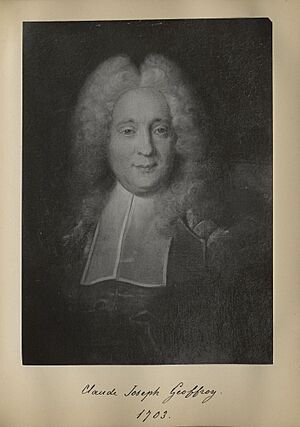Claude Joseph Geoffroy facts for kids
Claude Joseph Geoffroy (born August 8, 1685, in Paris; died March 9, 1752, in Paris) was a smart French scientist. He was the younger brother of another famous scientist, Étienne François Geoffroy. Like his brother, Claude Joseph was an apothecary (which is like a pharmacist who prepares medicines) and a chemist. He knew a lot about botany (the study of plants). He was especially interested in studying the essential oils found in plants.
A Life of Science
Claude Joseph Geoffroy was born in Paris. His father was Matthieu François Geoffroy. In 1703, when he was 18, he became a master apothecary. This meant he was fully qualified to prepare and sell medicines.
He loved to learn. In 1704 and 1705, he went on scientific trips across southern France. He studied plants even more deeply under a famous botanist named Joseph Pitton de Tournefort in 1707.
When his father passed away in 1708, Claude Joseph took over the family pharmacy. He continued his scientific work. In May 1711, he was chosen to be a member of the Académie Royale des Sciences (Royal Academy of Sciences). This was a very important group of scientists in France. He first joined the "botany section" because of his plant knowledge. Later, in 1715, he moved to the "chemistry section."
From 1718 to 1720, he helped manage the apothecaries in Paris. He also worked as an inspector of pharmacies at the Hôtel-Dieu, a famous hospital. In 1731, he became an alderman in Paris. This was an important role in the city government.
His Discoveries
Claude Joseph Geoffroy published many articles about his research. These articles appeared in the Histoire et Mémoires de l'Académie royale des sciences from 1707 to 1751.
One of his important contributions was in 1729. He used a method to figure out how strong vinegar was. He did this by adding small amounts of potassium to it. This was the first time anyone recorded using a method called "titration." Titration is a way to find the exact amount of a substance in a solution.
Geoffroy the Younger
To tell him apart from his older brother, Étienne François Geoffroy, Claude Joseph is often called Geoffroy the Younger. However, this can sometimes be confusing. Claude Joseph also had a son named Claude François Geoffroy (1729–1753). His son is also known as "Claude Geoffroy the Younger." So, there were two "Claude Geoffroy the Younger" scientists!
What He Studied
Claude Joseph Geoffroy wrote about many different scientific topics. His studies often focused on plants and chemistry. Here are some examples of the types of things he wrote about:
- He studied essential oils from plants. These are the strong-smelling oils that give plants their scent and flavor. He also wondered why plant leaves and flowers have different colors.
- He wrote about river crayfish, which are small creatures that live in freshwater.
- He explored how truffles (a type of mushroom that grows underground) grow.
- He looked at vinegar that had been made stronger by freezing it.
- He even investigated if olive oil could be a cure for snake bites.
- He helped write about a new remedy for kidney stones. This was a big deal at the time, and the discoverer even received a reward from the English Parliament.
- He also helped create pharmacy formulas for the king's military hospitals.
 | Precious Adams |
 | Lauren Anderson |
 | Janet Collins |


